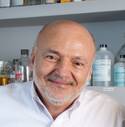Author Interviews, Biomarkers, Cancer Research, Colon Cancer / 06.06.2024
Weill Cornell Scientists Discover New Set of Biomarkers To Predict Colon Cancer Survival
MedicalResearch.com Interview with:
Jorge Moscat, PhD
Maria T. Diaz-Meco, PhD

 Principal Investigators
Moscat & Diaz-Meco Laboratories
Department of Pathology and Laboratory Medicine
Weill Cornell Medicine
New York, NY
MedicalResearch.com: What is the background for this study?
Would you describe the two different histological premalignant states?
Response: Although much effort is devoted to understanding the biology and pathology of established malignant tumors and the formation of metastasis in order to identify new and more efficacious treatment approaches, much less is understood of how tumors initiate from normal cells.
This is extremely important because treating incipient benign neoplasia should be easier and less toxic than treated already aggressive and disseminated cancer cells. In the case of colorectal cancer (CRC), routinary colonoscopies might identify still benign lesions that can be either “serrated” or “conventional” but that all present with reduced levels of two proteins called the aPKCs. As the tumor evolves, if the aPKCs are not upregulated, then the cancer becomes very aggressive and with very limited therapeutic options. Our work identifies precisely the initial mechanisms that determine if a benign adenoma would progress towards an aggressive phenotype. A full comprehension of these initial steps will lead to effective preventive therapies to stop cancer before it starts.
(more…)
Principal Investigators
Moscat & Diaz-Meco Laboratories
Department of Pathology and Laboratory Medicine
Weill Cornell Medicine
New York, NY
MedicalResearch.com: What is the background for this study?
Would you describe the two different histological premalignant states?
Response: Although much effort is devoted to understanding the biology and pathology of established malignant tumors and the formation of metastasis in order to identify new and more efficacious treatment approaches, much less is understood of how tumors initiate from normal cells.
This is extremely important because treating incipient benign neoplasia should be easier and less toxic than treated already aggressive and disseminated cancer cells. In the case of colorectal cancer (CRC), routinary colonoscopies might identify still benign lesions that can be either “serrated” or “conventional” but that all present with reduced levels of two proteins called the aPKCs. As the tumor evolves, if the aPKCs are not upregulated, then the cancer becomes very aggressive and with very limited therapeutic options. Our work identifies precisely the initial mechanisms that determine if a benign adenoma would progress towards an aggressive phenotype. A full comprehension of these initial steps will lead to effective preventive therapies to stop cancer before it starts.
(more…)

 Principal Investigators
Moscat & Diaz-Meco Laboratories
Department of Pathology and Laboratory Medicine
Weill Cornell Medicine
New York, NY
MedicalResearch.com: What is the background for this study?
Would you describe the two different histological premalignant states?
Response: Although much effort is devoted to understanding the biology and pathology of established malignant tumors and the formation of metastasis in order to identify new and more efficacious treatment approaches, much less is understood of how tumors initiate from normal cells.
This is extremely important because treating incipient benign neoplasia should be easier and less toxic than treated already aggressive and disseminated cancer cells. In the case of colorectal cancer (CRC), routinary colonoscopies might identify still benign lesions that can be either “serrated” or “conventional” but that all present with reduced levels of two proteins called the aPKCs. As the tumor evolves, if the aPKCs are not upregulated, then the cancer becomes very aggressive and with very limited therapeutic options. Our work identifies precisely the initial mechanisms that determine if a benign adenoma would progress towards an aggressive phenotype. A full comprehension of these initial steps will lead to effective preventive therapies to stop cancer before it starts.
(more…)
Principal Investigators
Moscat & Diaz-Meco Laboratories
Department of Pathology and Laboratory Medicine
Weill Cornell Medicine
New York, NY
MedicalResearch.com: What is the background for this study?
Would you describe the two different histological premalignant states?
Response: Although much effort is devoted to understanding the biology and pathology of established malignant tumors and the formation of metastasis in order to identify new and more efficacious treatment approaches, much less is understood of how tumors initiate from normal cells.
This is extremely important because treating incipient benign neoplasia should be easier and less toxic than treated already aggressive and disseminated cancer cells. In the case of colorectal cancer (CRC), routinary colonoscopies might identify still benign lesions that can be either “serrated” or “conventional” but that all present with reduced levels of two proteins called the aPKCs. As the tumor evolves, if the aPKCs are not upregulated, then the cancer becomes very aggressive and with very limited therapeutic options. Our work identifies precisely the initial mechanisms that determine if a benign adenoma would progress towards an aggressive phenotype. A full comprehension of these initial steps will lead to effective preventive therapies to stop cancer before it starts.
(more…)









